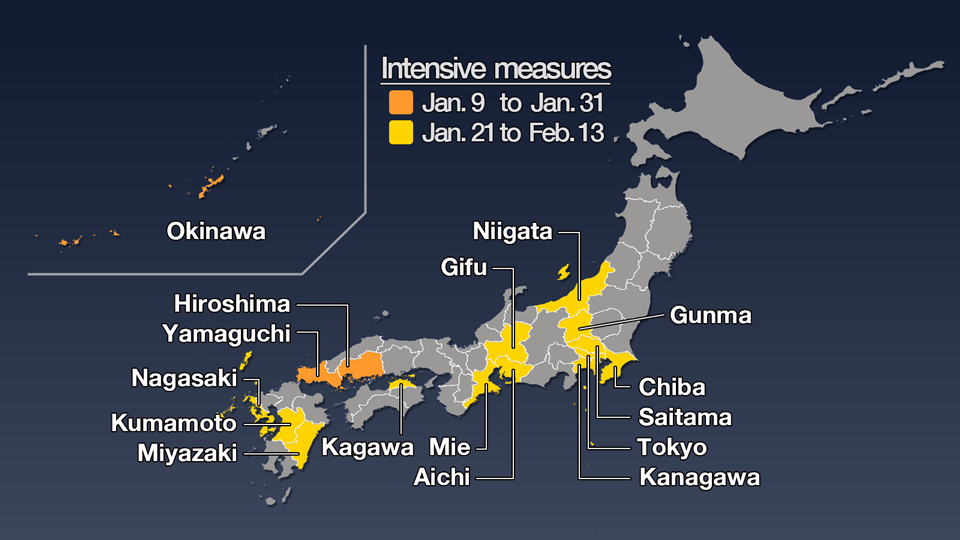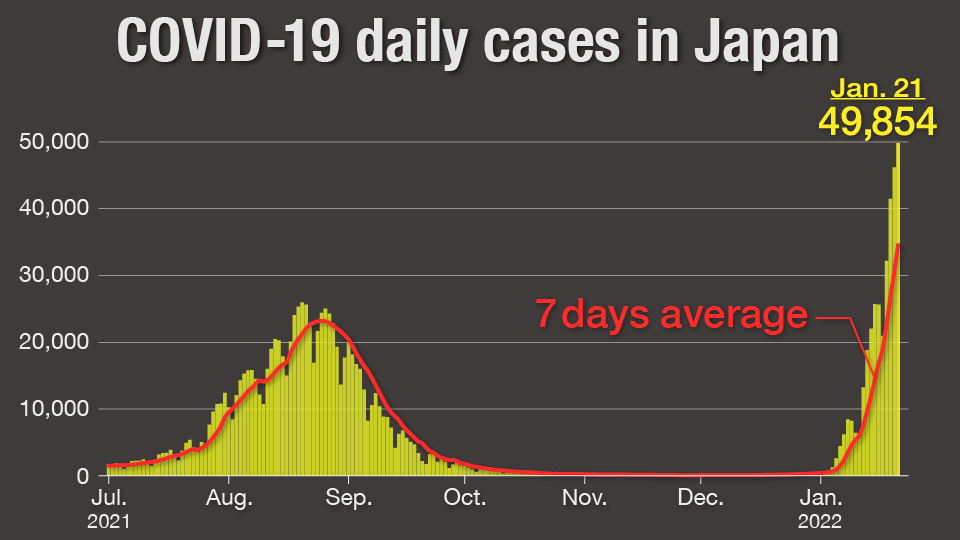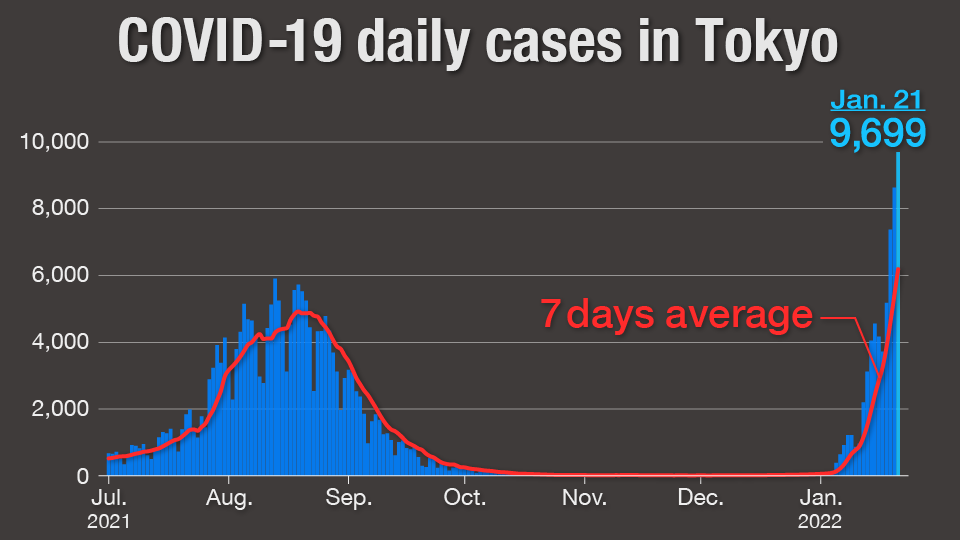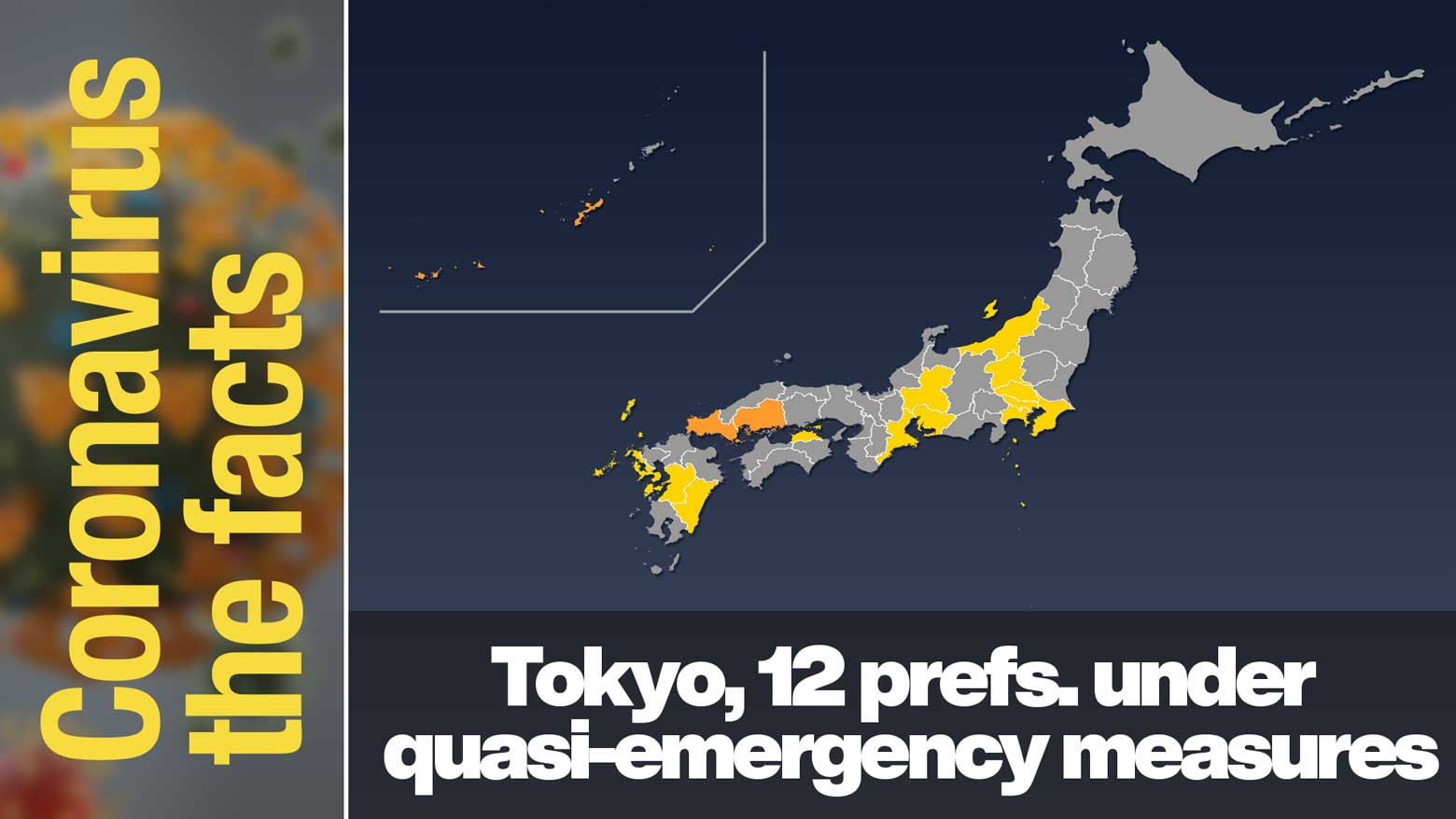This is our series on key coronavirus-related information. Click here to read other installments: #Coronavirus the facts. Find the latest information and answers from experts on everything COVID-19.
13 prefs. added to quasi-emergency: Jan 21 - Feb 13

Japan's government is expanding quasi-emergency measures to 13 prefectures where the Omicron variant of COVID-19 is spreading at a rapid pace.
The measures are designed to help local governments protect their healthcare systems and take steps to curb the infection rate. They go into effect on January 21 and are scheduled to run until February 13. Governors have been given the authority to impose stricter measures in target areas.
The prefectures affected are Tokyo, Saitama, Chiba, Kanagawa, Gunma, Niigata, Aichi, Mie, Gifu, Kagawa, Nagasaki, Kumamoto and Miyazaki.
Three other prefectures—Okinawa, Yamaguchi and Hiroshima—are already subject to the measures.
*Click here to learn more about measures in Okinawa, Yamaguchi and Hiroshima.
Unprecedented surge


Infections are surging across Japan at an unprecedented pace. On January 21, a record 49,854 people tested positive, far exceeding the peak of 25,992 set last August during the fifth wave of infections.
On the same day, Tokyo reported its highest number of cases to date: 9,699.
As of January 17, hospitals in the capital were at 21.1 percent occupancy, exceeding the 20-percent mark that the Tokyo Metropolitan Government set as a trigger to ask the central government for stricter measures. Tokyo and the three surrounding prefectures of Saitama, Chiba, and Kanagawa responded by jointly asking the central government to impose the quasi-emergency measures.
The central government said on January 19 the infection situation in each area had risen to level two on a scale of zero to four. That scale assesses infections primarily in terms of the strain on medical services.
*Click here to learn more about Japan's 5-point scale assessment.
Other prefectures
Other prefectures are considering asking to be added to the list. Osaka, Hyogo, Kyoto, Shizuoka, Hokkaido, Fukuoka, Saga, and Oita could soon be subject to tighter measures.
Detailed measures
These are the broad measures being implemented in each prefecture. For full details, check the attached links.
Tokyo
https://www.bousai.metro.tokyo.lg.jp/1009757/1020861.html
Dining
Eating and drinking establishments that have been certified as taking anti-virus measures can choose whether to operate between 5 a.m. to 8 p.m. without serving alcohol, or to serve alcohol between 11 a.m. and 8 p.m. and close at 9 p.m.
Establishments without that certification are being asked to stop serving alcohol entirely and close at 8 p.m.
Subsidies
Certified establishments that comply with the request and choose to serve alcohol will be paid 25,000 to 200,000 yen a day, depending on their revenue. If they choose not to serve alcohol, they will be paid 30,000 to 200,000 yen a day, depending on their revenue.
Non-certified establishments that comply with the request will be paid 30,000 to 200,000 yen a day, depending on their revenue.
Group size
Group sizes are capped at four people unless the establishment is certified and all members of the party can show negative test results. PCR test results are valid for three days after the test date; antigen test results are valid for one day after the test date.
Other facilities
Facilities other than eateries are not being asked to shorten their hours, but are being asked to follow guidelines set for each industry.
Excursions
People are being asked to refrain from non-essential outings or avoid crowded places and busy times. They are also being asked to refrain from visiting dining establishments that do not comply with the requests.
Events
When loud live audiences are expected at venues where the capacity is 10,000 or less, organizers must operate at half capacity. If the capacity is more than 10,000, the cap is 5,000.
If the event is expected to draw a quieter audience, organizers can fill a venue with a capacity of less than 5,000. For venues with a capacity of 5,000 to 20,000, organizers are allowed to fill the venue if they submit a plan outlining anti-infection measures to local authorities.
At venues with more than a 20,000 capacity, organizers are allowed to fill the venue if they submit a plan outlining anti-infection measures to local authorities and verify that audience members have negative test results.
Saitama Prefecture
https://www.pref.saitama.lg.jp/a0401/covid19/saitamaken_kyouyokuyousei220119.html
Dining
In principle, regardless of whether they are certified or not, eating and drinking establishments are being asked to close by 8 p.m. and stop serving alcohol entirely. But establishments can operate until 9 p.m. and serve alcohol until 8:30 p.m. if they register and agree to use coronavirus vaccine records and proof of negative test results.
Chiba Prefecture
https://www.pref.chiba.lg.jp/kenfuku/kansenshou/ncov/soti52.html
Dining
Eating and drinking establishments that have been certified as taking anti-virus measures are being asked to close by 9 p.m. and can serve alcohol until then. Those that comply will be subsidized.
Eating and drinking establishments that have not been certified are being asked to stop serving alcohol entirely and close by 8 p.m. They will not receive any subsidies.
All establishments are being asked to limit the number of customers to four per table.
For wedding ceremonies, five or more people are allowed to share a table if they show proof of negative test results. Organizers have to notify the prefecture in advance to qualify.
Kanagawa Prefecture
https://www.pref.kanagawa.jp/docs/ga4/covid19/index.html
Dining
Eating and drinking establishments that have been certified as taking anti-virus measures can stay open until 9 p.m. but are requested to stop serving alcohol by 8 p.m. Alternatively, they can stop serving alcohol entirely and close by 8 p.m.
Establishments without that certification are requested to stop serving alcohol completely and close by 8 p.m.
Subsidies
Certified establishments that comply with the request and choose to serve alcohol will be paid 25,000 to 75,000 yen a day, depending on their revenue. If they opt not to serve alcohol and close by 8 p.m., they will be paid 30,000 to 100,000 yen a day, depending on their revenue. Non-certified establishments that comply with the request will be paid 30,000 to 100,000 yen a day, depending on their revenue.
If they wish to hold wedding ceremonies or other events at certified establishments, they can be exempted from limitations on the number of people as long as they receive proof of negative test results on the day from everyone who attends.
Events
When organizers want to hold large events, they have to create anti-infection check lists. Then, when loud live audiences are expected, the cap is 5,000 or half capacity, whichever is smaller.
If the event is expected to draw a quieter audience, organizers can fill a venue with a capacity of less than 5,000. For venues with a capacity of more than 5,000, organizers have to submit a plan outlining anti-infection measures to local authorities, and if local authorities permitted it, the cap rises to 20,000. If organizers can confirm negative test results for all spectators on the day of the event, there will be no upper limit.
Dining
The intensive measures are targeted at eating and drinking establishments, as well as recreational facilities, including karaoke and wedding venues.
The prefecture asks such businesses to choose whether to remain open from 5 a.m. to 8 p.m. without alcohol or to offer alcohol until 8 p.m. and close by 9 p.m. Uncertified businesses are being asked to operate without alcohol throughout the day.
A maximum of four people is allowed per table for eating or drinking.
Small and mid-sized companies that comply with the requests, certified or uncertified, will be supported financially. Certified firms will be paid 25,000 to 100,000 yen a day according to their sales; uncertified ones will be entitled to 30,000 to 100,000 yen per day. For large companies, up to 200,000 yen will be paid per day if they follow the requests.
Niigata Prefecture
https://www.pref.niigata.lg.jp/site/shingata-corona/#jokyo
Dining
Eating and drinking establishments that have been certified as taking anti-virus measures can stay open until 9 p.m. but are requested to stop serving alcohol by 8 p.m. Alternatively, they can stop serving alcohol entirely and close by 8 p.m.
Establishments without that certification are being asked to stop serving alcohol altogether and close at 8 p.m.
Certified establishments that comply with the request and choose to serve alcohol will be paid 25,000 to 200,000 yen a day, depending on their revenue. If they choose not to serve alcohol, they will be paid 30,000 to 200,000 yen a day, depending on their revenue.
Schools
Extracurricular activities at prefectural schools are only allowed on weekdays with a time limit of around 90 minutes.
Aichi Prefecture
https://www.pref.aichi.jp/site/covid19-aichi/covid19-aichi.html
Quasi-emergency measures apply to 52 municipalities. Toei Town and Toyone Village are not affected.
Dining
Eating and drinking establishments that have been certified as taking anti-virus measures can stay open until 9 p.m. but are requested to stop serving alcohol by 8 p.m. Alternatively, they can stop serving alcohol entirely and close by 8 p.m.
Establishments without that certification are requested to stop serving alcohol altogether and close by 8 p.m. Establishments both certified and uncertified are also asked to limit group sizes to four people.
Larger subsidies will be available for establishments that do not serve alcohol.
Events
For sports and other large-scale events, organizers can permit up to 20,000 people if they submit a plan outlining anti-infection measures to local authorities. For other events, the attendance cap is set at 5,000 people, but when loud live audiences are expected at venues, organizers must operate at half capacity.
Schools
Schools are asked to consider staggering hours or getting students to attend classes on alternate days, as well as providing lessons online.
For extracurricular activities, they are asked to refrain from holding practice matches and training camps.
Gifu Prefecture
https://www.pref.gifu.lg.jp/site/covid19/198866.html
Dining
All eating and drinking establishments, regardless of whether they are certified or not, are asked to stop serving alcohol entirely and close by 8 p.m. Those that comply with the request will be paid 30,000 to 200,000 yen a day, depending on their revenue.
Mie Prefecture
https://www.pref.mie.lg.jp/covid19.shtm
The measures apply to 24 municipalities, but exclude five in the southern part of the prefecture where infection cases are relatively low.
Certified eating and drinking establishments in the target areas are being asked to choose whether to close by 9 p.m. serving alcohol, or by 8 p.m. without serving alcohol. Uncertified establishments are urged to stop operating by 8 p.m. and stop serving alcohol. Those complying with the requests will be subsidized.
Kagawa Prefecture
https://www.pref.kagawa.lg.jp/kenkosomu/kikikanri/20220121manenbousijyuutensoti.html
The measures apply to 14 municipalities. The capital Takamatsu and seven other cities and six towns are subject to the measures.
Dining
Eating and drinking establishments that have been certified as taking anti-virus measures can stay open until 9 p.m. but are requested to stop serving alcohol by 8 p.m. Alternatively, they can stop serving alcohol entirely and close by 8 p.m.
Establishments without that certification are requested to stop serving alcohol altogether and close by 8 p.m.
Small and mid-sized companies, both certified and uncertified, will be supported financially if they comply with the requests. Certified establishments that close by 9 p.m. will be paid 25,000 to 75,000 yen a day depending on their sales. Businesses certified to close by 8 p.m. and those that are not certified will be paid 30,000 to 100,000 yen per day. For large companies, up to 200,000 yen will be paid per day if they follow the requests.
Group sizes are capped at four people unless the establishment is certified and all members of the party can show negative test results.
Nagasaki Prefecture
The cities of Nagasaki and Sasebo are subject to the measures.
Dining
All eating and drinking establishments, certified or not, are being asked to stop serving alcohol completely and close by 8 p.m.
Small and mid-sized establishments that comply with the request will be paid 30,000 to 100,000 yen a day, depending on their revenue. Large establishments will be paid 40 percent of the losses they incur for abiding by the request, up to 200,000 yen per day.
Excursions
The governor has called on residents to refrain from non-essential outings. Those who dine out are requested to use certified establishments in groups of no more than four people and for less than two hours.
Kumamoto Prefecture
https://www.pref.kumamoto.jp/soshiki/30/110944.html
Dining
Certified restaurants and bars can choose whether to remain open until 9 p.m. while offering alcohol or to close by 8 p.m. without serving alcohol. The prefecture urges uncertified businesses to close by 8 p.m. and to stop serving alcohol. Financial support will be provided for both types of establishments.
Facilities with a floor space of more than 1,000 square meters are being asked to restrict the number of visitors, but not to shorten their operating hours.
Schools
Prefectural schools are asked to consider staggering hours or getting students to attend classes on alternate days, as well as shortening class hours.
Miyazaki Prefecture
https://www.pref.miyazaki.lg.jp/kohosenryaku/covid-19/chiji/20220119183702.html
Miyakonojo City and Mimata Town are subject to the measures from January 21. The prefecture is considering adding more areas.
Dining
Starting January 16, the prefecture has asked all eating and drinking establishments in the two municipalities to close by 8 p.m. and to refrain from serving alcohol entirely.
Establishments that comply are eligible for daily payments of 20,000 yen from the prefecture. The prefecture also plans to offer subsidies of 30,000 to 200,000 yen per day, depending on revenue, using funds from the central government.
Excursions
The prefecture will not ask residents to refrain from unnecessary outings, but it is calling on people living in the two targeted areas, as well as the cities of Miyazaki and Nobeoka, to stay in their municipalities unless they need to attend work or school, or for other essential reasons.
This information is accurate as of January 21, 2022.
